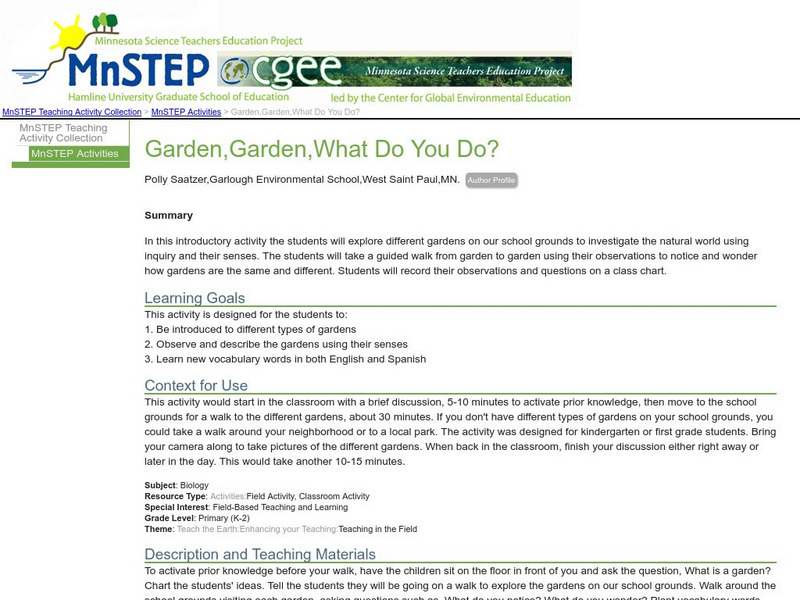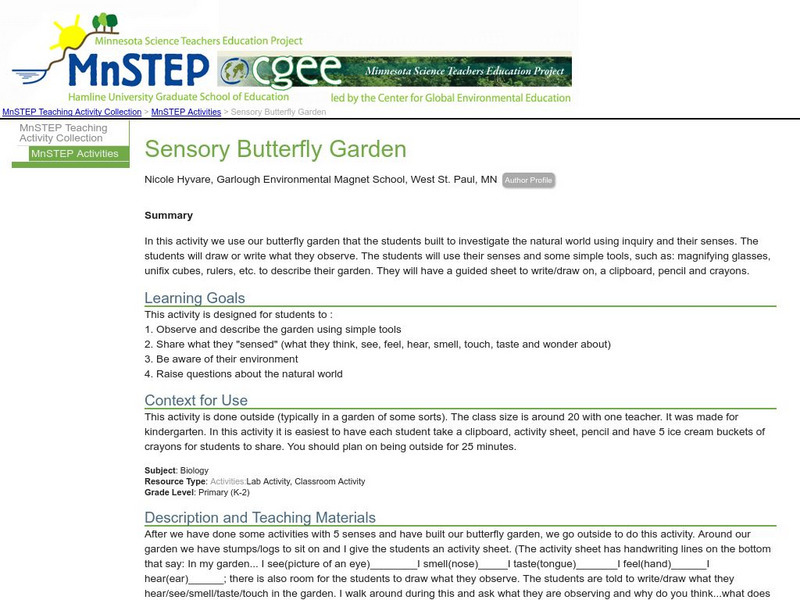Hi, what do you want to do?
Curated OER
Spending Public Money
Learners work in small groups. They imagine that they are the council committee. Students choose from a list of projects to be funded. They have one hundred thousand dollars to spend and they have to spend the money on a project that...
Curated OER
Water Pollution Lesson Plan: Don't Trust Your Eyes
Young scholars develop a list of actions they could perform that would protect our water resources from pollution. They formulate hypotheses, conduct experiments and draw conclusions about actual pollutants found in our water supply.
Curated OER
Mini-Sanitary Landfill
Second graders work in groups to bury a variety of trash items and arrange them in a mini-landfill. They predict which items will biodegrade and then keep records of what the items look like every ten days. Students consider how...
Curated OER
Plants
Students identify and label parts of a plant. They will construct a plant from art material and describe the purpose of each part for the plants survival. Students author a book with pictures and words or a story about a plant.
Curated OER
Introduction To Bug Collecting
Students explore process of live collection of insects and spiders using sweep nets, aerial nets, and beating sheets. they collect, examine and release several different types of insects or spiders then compare their journal drawing of...
Curated OER
Our Environment
Pupils engage in a literature study that helps students to connect with some of the issues of conservation. They list parts of the environment that need protection with the help of a graphic organizer. Then pupils discuss in groups why...
Curated OER
Capture the Running Flag
Students practice a form of locomotion - walk, jog, gallop, skill. They select 2 to 4 flag holders and each one has a flag tucked into back pocket or waist band with flag exposed down to at least the knee. The goal for the non-flag...
Curated OER
Measure-mania
Students research the history of measurement in this lesson. They compare todays units of measurement to historical units of measurement. For example, they weigh themselves on a bathroom scale and figure out how many of them it would...
Curated OER
Be Healthy for School (Secondary)
In this health worksheet, students learn the benefits of exercise and healthy eating. Students read the information on the page and answer 2 essay questions about healthy eating and exercise.
Curated OER
Verb Pattern Error Correction
In this proofreading and editing worksheet, students analyze 13 sentences, some that contain errors. Students determine if there are mistakes and correct those they see.
Curated OER
Pronoun Case: I, Me, My, Mine, and Myself
In this pronoun cases activity, learners read the sentences and determine which pronoun case completes the sentence. Students write in the option of I, me, my, mine, or myself for each sentence.
Curated OER
Nouns
In this nouns worksheet, students use the following nouns to complete the sentences: lance, optician, nutmeg, clown, pen, trumpet, eagle, hoe, mechanic, and stetson. Students then make a list of all of the nouns in the second set of...
Curated OER
Tile My Bathroom Floor
Seventh graders create a bathroom floor plan using measurement math. In this measurement lesson, 7th graders use measurement, proportionality, estimation, and area to design a floor plan. Students design floor tiles using centimeter...
Curated OER
Breaking News English: Police to Charge Balloon Boy Father
For this English worksheet, students read "Police to Charge Balloon Boy Father," and then respond to 47 fill in the blank, 7 short answer, 20 matching, and 8 true or false questions about the selection.
Curated OER
My Top Interdisciplinary Social Studies Lesson Plans
Here are some top social studies lesson plans and activities which present concepts in a memorable fashion.
Curated OER
MOSAICS
This instructional activity will teach the students about how Mosaics are made and how they have been used in the past history and in modern times. Students will construct their own paper mosaics.
Nature Conservancy
Nature Works Everywhere: Tips for Starting a School Garden
Find a useful guide to help start a school garden. Kids will dig the class project!
Science Education Resource Center at Carleton College
Serc: Garden, Garden, What Do You Do?
Students explore different gardens on our school grounds to investigate the natural world using inquiry and their senses. The students will take a guided walk from garden to garden using their observations to notice and wonder how...
Alabama Learning Exchange
Alex: What's in Your Secret Garden?
After reading F.H. Burnett's The Secret Garden, students create their own secret gardens and design a slideshow presentation of their gardens to share with the class.
Polk Brothers Foundation Center for Urban Education at DePaul University
De Paul University: Center for Urban Education: A Garden in Lawndale [Pdf]
"A Garden in Lawndale" is a one page, non-fiction, reading passage about an eighth grade class who planted a garden in a vacant lot by their school and maintained it to improve their neighborhood. It is followed by constructed-response...
Other
Hubbard's Cupboard: The Enormous "Kinder" Garden
In this unit from Hubbard's Cupboard, an elementary class will read several books together, each having a strong connection to the next. There are ideas for cross-curricular lessons, so this could be a site that shapes the next several...
Science Education Resource Center at Carleton College
Serc: Mn Step: Sensory Butterfly Garden
This activity requires a small butterfly garden. In this case, the class had created one. Student explore the garden and record scientific observations made using their senses.
Missouri Botanical Garden
Missouri Botanical Garden: Tundra Animals
Explore this comprehensive resource on the birds and mammals of the tundra. This resource features information such as diet, class, order, size, habitat, conservation range and the like.
University of Arizona
University of Arizona: Az Master Gardener Manual: Properties of Soil
Site provides a brief description of soil texture as well as discusses the relative size of soil particles.
























![De Paul University: Center for Urban Education: A Garden in Lawndale [Pdf] Unit Plan De Paul University: Center for Urban Education: A Garden in Lawndale [Pdf] Unit Plan](https://static.lp.lexp.cloud/images/attachment_defaults/resource/large/FPO-knovation.png)


